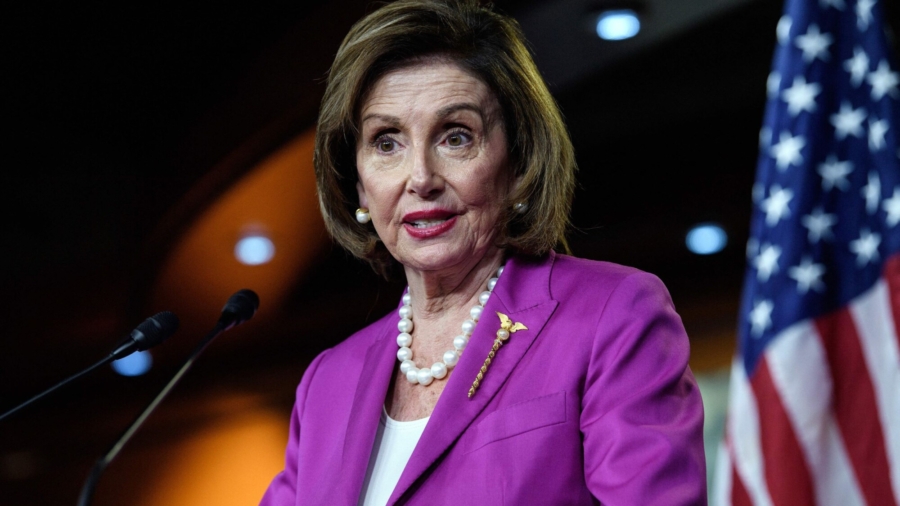A set of 2021 comments by then-House Speaker Nancy Pelosi (D-Calif.) ended up undermining President Joe Biden’s efforts to implement a student loan cancellation plan.
On Friday, the U.S. Supreme Court ruled 6-3 that Biden could not excuse student debt repayments through the Higher Education Relief Opportunities for Students Act of 2003 (HEROES Act) or any other authority belonging to the executive branch. Reinforcing their opinion, the court’s majority noted a July 28, 2021 press conference in which Pelosi also cast doubt on the possibility of student loan cancellation.
“As then-Speaker of the House Nancy Pelosi explained: ‘People think that the President of the United States has the power for debt forgiveness. He does not. He can postpone. He can delay. But he does not have that power. That has to be an act of Congress,'” reads the majority opinion (pdf) as written by Chief Justice John Roberts.
Roberts was joined in his decision by Justices Clarence Thomas, Samuel Alito, Neil Gorsuch, Brett Kavanaugh, and Amy Coney Barrett.
The Biden administration argued that the HEROES Act, which passed with unanimous support in 2003, enabled his administration to cancel student loans. The 2003 law states that the secretary of education, an executive branch office, has the authority to “waive or modify” student loan repayments “in connection with a war or other military operation or national emergency.”
The Biden administration argued that this ability to “waive or modify” loan repayments includes the ability to cancel student debt, and that COVID-19 was a qualifying emergency case for which such debt cancellation could occur. Last year, Biden Administration Education Secretary Miguel Cardona unveiled a student loan forgiveness program that could have canceled as much as $20,000 in loans for 40 million borrowers.
The Congressional Budget Office said the plan might have cost about $400 billion, but the Wharton School estimated the price tag could have ballooned past $1 trillion.
In her dissenting opinion, Justice Elena Kagan wrote that “Student loans are in the [Secretary of Education’s] wheelhouse. And so too, Congress decided, relief from those loan obligations in case of emergency. That delegation was the entire point of the HEROES Act.” Kagan was joined in her dissent by Justices Sonia Sotomayor and Ketanji Brown Jackson.
Roberts, however, rebutted Kagan’s dissenting opinion, arguing that it’s hard to square the unanimous support for the HEROES Act in 2003 with the reaction to the Biden administration’s claim that the law covered debt cancellation—a claim that met with fierce Republican opposition.
“Imagine instead asking the enacting Congress a more pertinent question: ‘Can the Secretary use his powers to abolish $430 billion in student loans, completely canceling loan balances for 20 million borrowers, as a pandemic winds down to its end?'” Roberts wrote. “We can’t believe the answer would be yes. Congress did not unanimously pass the HEROES Act with such power in mind.”
Pelosi has been in Congress since 1987, and served at the time the HEROES Act passed unanimously in 2003. Roberts pointed to Pelosi’s 2021 comments as evidence that members of the session of Congress that passed the HEROES Act did not believe it allowed for student loan cancellation.
NTD News reached out to Pelosi’s office for comment about how Roberts used her July 2021 remarks, but did not receive a response before this article was published.
Student loan borrowers have not had to make payments on their loans for more than three years since the start of the U.S. COVID-19 pandemic emergency orders in March of 2020. Biden set May 11 as the expiration date for the Trump-era national and public health emergencies—despite those emergencies providing part of his justification for the student debt cancellation plan.
After a three-and-a-half-year pause, student loans will once again start accruing interest on Sept. 1, 2023, and payments will be due starting in October.

